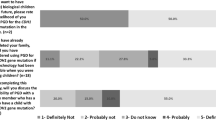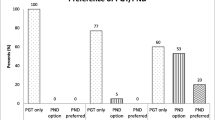Abstract
Preimplantation genetic diagnosis (PGD) allows couples to avoid having a child with an inherited condition, potentially reducing cancer burden in families with a hereditary cancer predisposition. This study investigated and compared awareness and acceptance of PGD among patients with different hereditary cancer syndromes. Questionnaires were mailed to 984 adults with hereditary breast and ovarian cancer, Lynch syndrome, familial adenomatous polyposis, or multiple endocrine neoplasia type 1 or 2. Associations between clinical, demographic, and psychosocial factors and awareness and acceptance of PGD were examined. Of 370 respondents (38 % return rate), 28 % felt their syndrome impacted family planning, 24 % were aware of PGD, 72 % felt that PGD should be offered, 43 % would consider using PGD, and 29 % were uncertain. Family experience and syndrome-specific characteristics, such as disease severity, quality of life and availability of medical interventions as well as gender, family planning stage, and religiosity impact perceptions of the acceptability of PGD, though a high level of uncertainty exists. Hereditary cancer patients lack awareness of PGD despite feeling that PGD should be offered, highlighting the need for education on this topic. While we found attitudes about the acceptability of PGD to be generally similar to those reported in the literature and of genetics and ethics experts, we observed similarities and differences between syndromes that provide insight into why some hereditary cancer patients may find PGD more acceptable than others.
Similar content being viewed by others
References
Offit K et al (2006) Cancer genetic testing and assisted reproduction. J Clin Oncol 24(29):4775–4782
The Council on Ethical and Judicial Affairs A.M.A (1994) Ethical issues related to prenatal genetic testing. Arch Fam Med 3(7):633–642
Ford D et al (1998) Genetic heterogeneity and penetrance analysis of the BRCA1 and BRCA2 genes in breast cancer families. The breast cancer linkage consortium. Am J Hum Genet 62(3):676–689
King MC, Marks JH, Mandell JB (2003) Breast and ovarian cancer risks due to inherited mutations in BRCA1 and BRCA2. Science 302(5645):643–646
Chen S et al (2006) Characterization of BRCA1 and BRCA2 mutations in a large United States sample. J Clin Oncol 24(6):863–871
Antoniou A et al (2003) Average risks of breast and ovarian cancer associated with BRCA1 or BRCA2 mutations detected in case Series unselected for family history: a combined analysis of 22 studies. Am J Hum Genet 72(5):1117–1130
Kohlmann W and SB Gruber (1993) Lynch Syndrome 2010/03/20:[Available from: http://www.ncbi.nlm.nih.gov/entrez/query.fcgi?cmd=Retrieve&db=PubMed&dopt=Citation&list_uids=20301390
Petersen GM, Slack J, Nakamura Y (1991) Screening guidelines and premorbid diagnosis of familial adenomatous polyposis using linkage. Gastroenterology 100(6):1658–1664
Howe JR, Norton JA, Wells SA Jr (1993) Prevalence of pheochromocytoma and hyperparathyroidism in multiple endocrine neoplasia type 2A: results of long-term follow-up. Surgery 114(6):1070–1077
Brandi ML et al (2001) Guidelines for diagnosis and therapy of MEN type 1 and type 2. J Clin Endocrinol Metab 86(12):5658–5671
Kouvaraki MA et al (2006) Management of pancreatic endocrine tumors in multiple endocrine neoplasia type 1. World J Surg 30(5):643–653
Arvanitis ML et al (1990) Mortality in patients with familial adenomatous polyposis. Dis Colon Rectum 33(8):639–642
Dekeuwer C, Bateman S (2013) Much more than a gene: hereditary breast and ovarian cancer, reproductive choices and family life. Med Health Care Philos 16(2):231–244
Hurley K et al (2012) Incorporating information regarding preimplantation genetic diagnosis into discussions concerning testing and risk management for BRCA1/2 mutations: a qualitative study of patient preferences. Cancer 118(24):6270–6277
Julian-Reynier C et al (2012) BRCA1/2 carriers: their childbearing plans and theoretical intentions about having preimplantation genetic diagnosis and prenatal diagnosis. Genet Med 14(5):527–534
Ormondroyd E et al (2012) Attitudes to reproductive genetic testing in women who had a positive BRCA test before having children: a qualitative analysis. Eur J Hum Genet 20(1):4–10
Quinn GP et al (2010) BRCA carriers’ thoughts on risk management in relation to preimplantation genetic diagnosis and childbearing: when too many choices are just as difficult as none. Fertil Steril 94(6):2473–2475
Quinn GP et al (2009) Decisions and ethical issues among BRCA carriers and the use of preimplantation genetic diagnosis. Minerva Med 100(5):371–383
Vadaparampil ST et al (2009) Factors associated with preimplantation genetic diagnosis acceptance among women concerned about hereditary breast and ovarian cancer. Genet Med 11(10):757–765
Quinn GP et al (2009) Conflict between values and technology: perceptions of preimplantation genetic diagnosis among women at increased risk for hereditary breast and ovarian cancer. Fam Cancer 8(4):441–449
Quinn G et al (2009) Attitudes of high-risk women toward preimplantation genetic diagnosis. Fertil Steril 91(6):2361–2368
Fortuny D et al (2009) Opinion about reproductive decision making among individuals undergoing BRCA1/2 genetic testing in a multicentre Spanish cohort. Hum Reprod 24(4):1000–1006
SenGupta SB, Vadaparampil ST, Menon U (2012) Preimplantation genetic diagnosis for hereditary cancers. Adv Exp Med Biol 732:103–113
Douma KF et al (2010) Attitudes toward genetic testing in childhood and reproductive decision-making for familial adenomatous polyposis. Eur J Hum Genet 18(2):186–193
Quinn GP et al (2010) High risk men’s perceptions of pre-implantation genetic diagnosis for hereditary breast and ovarian cancer. Hum Reprod 25(10):2543–2550
Staton AD et al (2008) Cancer risk reduction and reproductive concerns in female BRCA1/2 mutation carriers. Fam Cancer 7(2):179–186
Lammens C et al (2009) Attitude towards pre-implantation genetic diagnosis for hereditary cancer. Fam Cancer 8(4):457–464
Quinn GP et al (2012) High-risk consumers’ perceptions of preimplantation genetic diagnosis for hereditary cancers: a systematic review and meta-analysis. Genet Med 14(2):191–200
Kastrinos F et al (2007) Attitudes toward prenatal genetic testing in patients with familial adenomatous polyposis. Am J Gastroenterol 102(6):1284–1290
Menon U et al (2007) Views of BRCA gene mutation carriers on preimplantation genetic diagnosis as a reproductive option for hereditary breast and ovarian cancer. Hum Reprod 22(6):1573–1577
Julian-Reynier C et al (2009) Professionals assess the acceptability of preimplantation genetic diagnosis and prenatal diagnosis for managing inherited predisposition to cancer. J Clin Oncol 27(27):4475–4480
Brandberg Y et al (2008) Psychological reactions, quality of life, and body image after bilateral prophylactic mastectomy in women at high risk for breast cancer: a prospective 1-year follow-up study. J Clin Oncol 26(24):3943–3949
Meister U et al (2005) Knowledge and attitudes towards preimplantation genetic diagnosis in Germany. Hum Reprod 20(1):231–238
Krones T et al (2005) Public, expert and patients’ opinions on preimplantation genetic diagnosis (PGD) in Germany. Reprod Biomed Online 10(1):116–123
Fertility preservation and reproduction in cancer patients. Fertil Steril, 2005. 83(6): 1622–1628
Loren AW et al (2013) Fertility preservation for patients with cancer: american society of clinical oncology clinical practice guideline update. J Clin Oncol 31(19):2500–2510
Brandt AC et al (2010) Knowledge, attitudes, and clinical experience of physicians regarding preimplantation genetic diagnosis for hereditary cancer predisposition syndromes. Fam Cancer 9(3):479–487
Author information
Authors and Affiliations
Corresponding author
Rights and permissions
About this article
Cite this article
Rich, T.A., Liu, M., Etzel, C.J. et al. Comparison of attitudes regarding preimplantation genetic diagnosis among patients with hereditary cancer syndromes. Familial Cancer 13, 291–299 (2014). https://doi.org/10.1007/s10689-013-9685-0
Published:
Issue Date:
DOI: https://doi.org/10.1007/s10689-013-9685-0




